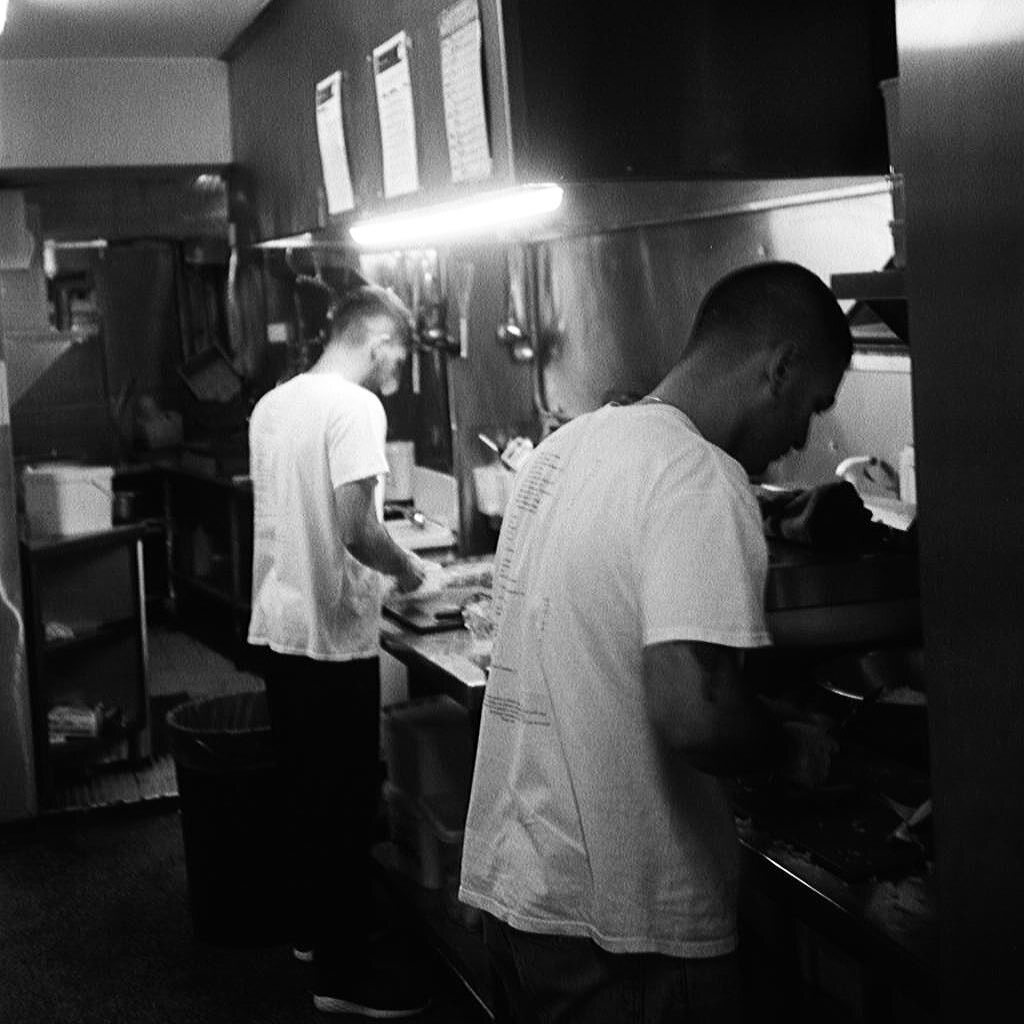I want to start by talking about how you’ve taken over the family business, and remade it in your own image. I know Sertaç was working in Copenhagen at the start of the pandemic, and then returned to help run the restaurant. Can you talk a little about that period?
For a long time we’d had a vision of changing our traditional kebab house into something that was more in tune with our own vision of our own desires when we would be dining out. So Sertaç had been away in Copenhagen for a couple of years really learning his craft, and then the pandemic happened, and it felt like an opportune time to softly implement these changes as we tested the waters and tried to push in a direction that felt honest to us in our vision as Londoners with Turkish roots, trying to offer the finest dining experience.
It’s always a fine line

How do you balance a respect for the culinary traditions of your heritage, with doing something new, that excites and challenges you both?
There’s a lot of overlap with using the ocakbasi fire with charcoal to provide a certain flavour. The challenge is to retain that familiarity with Turkish food whilst using the best possible local seasonal ingredients. It’s always a fine line, but I feel like we get the balance right most of the time. There’s always a lot of testing the waters, seeing how a dish might stick. It also pushes us to be as creative as we can, and makes the restaurant what we are today, when we have to overthink every dish, every ingredient, every construct of every meal. It makes everything worthwhile and keeps us ticking.
How do you find working together with family?
It’s very rewarding when you have a sibling bond and also work together to create something that’s true to ourselves, our heritage, our background, our family, where we’re both trying our best to be the best versions of ourselves. We support one another through changes, and there’s always a stronger foundation working with family. Even with our father, we have enormous respect for his output, and he has created these foundations for us, and I think that comes full circle when we work together as a family.

It feels like a really interesting time for London’s restaurants and food scene, with new critics emerging who work outside of broadsheets, and a lot of hype around newly opened restaurants. Can you speak a little on how that feels?
We really feel part of the restaurant scene of East London, in a way we maybe wouldn’t have if we were still a kebab house. We fit with a vision of what people in this part of London are after as a dining experience, and we see ourselves as peers with a lot of other restaurants that offer a similar output. It feels nice, because as businesses we all support each other; we dine in these establishments and people who work in other establishments come dine at ours, and it feels very inclusive, and it’s a nice support group during these difficult times.
It feels very inclusive
On the other side of it, as a customer, I think people understand that hospitality has been through a rough few years, and more and more people are prepared to spend the money on a dinner out, and are excited to try new things.
Yeah, I agree. Previously, I think prior to the pandemic definitely, maybe a restaurant would be a stopgap in your evening out, where you’d then go to bars, pubs, clubs, whatever. Now restaurants are more at the forefront of your evening plan, and the dining experience is the dominant part of your recreational life.

Not to overstate it, but there is a slight emerging trend of, not necessarily sobriety, but drinking less, and maybe a more considered kind of drinking. I feel like especially in Britain with pub culture, this is starting to be quite a big change, where people want an evening with more substance to it, and less pressure to be drunk.
Yeah, so I feel like restaurants now offer the whole package of what you seek in an evening. Where I feel like the culture of dining out and being out on a weekend, or even a week night, has sort of tempered down a bit and it’s a bit more, it’s a bit more calm, there’s more longevity to it, it’s more considered. And the output the restaurants are providing has also matched that with carefully selected dishes and ingredients. It’s a more wholesome experience.
It feels that a strong visual identity is so important to restaurants today, especially in terms of Instagram. I guess the T-shirt you launched is a part of that visual identity too?
The T-shirt was really, I guess it started with my Twitter account where I tweeted, “Love Kebabs, Hate Racism,” many years ago. We thought that was, at the time because we were a kebab house, it was a strong statement and tied in with our ethical beliefs. So as we reinvented the restaurant we thought, you know, that’s a good way for people to identify themselves with our restaurant, as we go through these changes.
Restaurants do have a powerful voice
It’s important to identify yourself with the right social causes that you fundamentally believe in. Restaurants do have a powerful voice in social media, and in the public discourse, especially as restaurants take more of a centre stage in the culture of London. So it feels very, it feels like it’s tying in with feeling strongly about a certain establishment and also aligning your own social beliefs to that. So we thought that this was the right statement for us, for something that we firmly believe in, even though the two topics might remain quite unrelated; kebabs and racism. But it kind of ties into the fact that kebabs are a big part of London culture, and having an anti-racist stance is also a big part of London culture.

I’m interested in a shift that is currently being talked about in restaurant and hospitality working culture. There are a lot of discussions around working hours, unpaid labour, and kitchen culture. Do you feel the industry is starting to change?
The industry is much more accountable, with good working conditions, payment structures, making employees feel valued and not dispensable, especially after Brexit. The industry has had to be very introspective and take care of its employees. Other models, I guess, aren’t as sustainable moving forward, unpaid internships and the like. It’s a bit like some of the creative industries, which have seen similar fallouts; living conditions are much more difficult than they used to be, the cost of living is going up, and the previous approach doesn’t seem to correlate with current living conditions. So it’s important that restaurants provide that real career structure for those joining, so that they can retain quality staff individuals.
I think also, over the last 15 to 20 years, hospitality has become a career and a profession in a way that it wasn’t before. So I think more and more when people begin working in that industry, they want lifetime progression.
I agree completely. Those entering hospitality, including chefs, they view the career seriously, rather than a fallback where, you know, you leave school and you enter the military or something. It’s a real industry, with professionals who want to grow and learn and it is taken a lot more seriously now.
The industry is much more accountable

For you, what’s the biggest challenge of running a restaurant? And then on the flip side, what’s the most rewarding thing about it?
Challenges: the high rates of tax, the cost of produce, the rents… Everything that is financial is very difficult, because you always want to not relay that back to the customer by raising your prices. Raising prices might seem like the easy way to deal with everything, but it’s not the most ethical way, because everyone’s wages haven’t exactly grown in correlation with the cost of living. So then that provides challenges of creating more profitable dishes that are just as tasty, finding new produce, being creative.
The rewarding side is always the service itself. The output, the experience that you provide to individuals, and their positive feedback. Day in and day out just being on that theatre stage of just offering the finest dining experience. That makes the hard work worthwhile, when you have happy customers returning again and again, leaving good reviews, and just enjoying the experience.
What’s on the horizon for Mangal II in 2023?
We want to continue remaining where we are, growing within our own confines and pushing to become the best version of ourselves. We’re not exactly where we want to be, even though things seem to be well received, so it’s exciting to continue this journey. We have our eyes on the prize in the sense that we want to make Mangal II the best version of Mangal II.
Read More: A Neighbourhood Restaurant Never Goes Out Of Style






